Abstract
Diabetes mellitus affects African Americans in disproportionate numbers relative to whites. Proper management of this disease is critical because of the increased morbidity and mortality associated with poor diabetes management. The role of social support in promoting diabetes management and improved glycemic control among African Americans is a little-explored area. This review, the second in a two-part series, examines the relationship between social support and glycemic control among African-American adults with diabetes. The main findings of the study are that African Americans tend to rely more heavily than whites on their informal social networks to meet their disease management needs and that social support is significantly associated with improved diabetes management among members of this population. However, there remains a critical need to systematically include substantial numbers of African-American respondents in studies examining the relationship between social support and glycemic control. Only then can the effects of age, gender, socioeconomic status, and other variables on this relationship in African Americans become clear and interventions incorporating relevant aspects of social support be developed.
Full text
PDF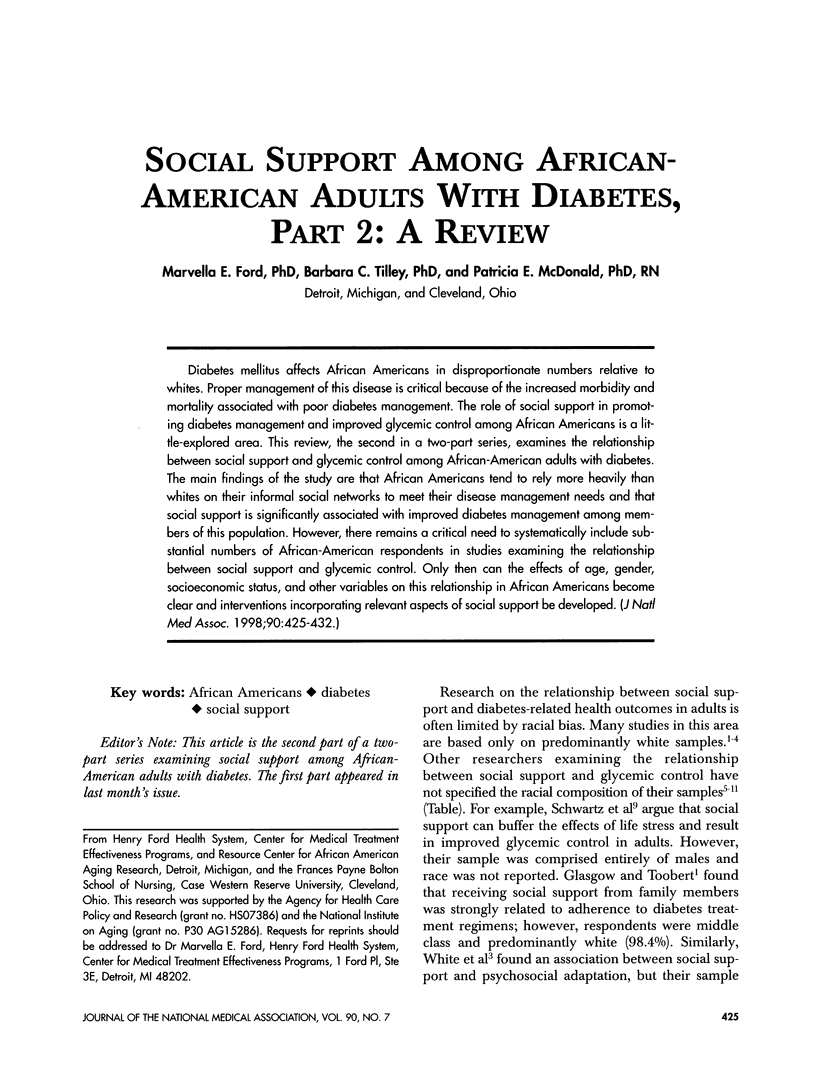
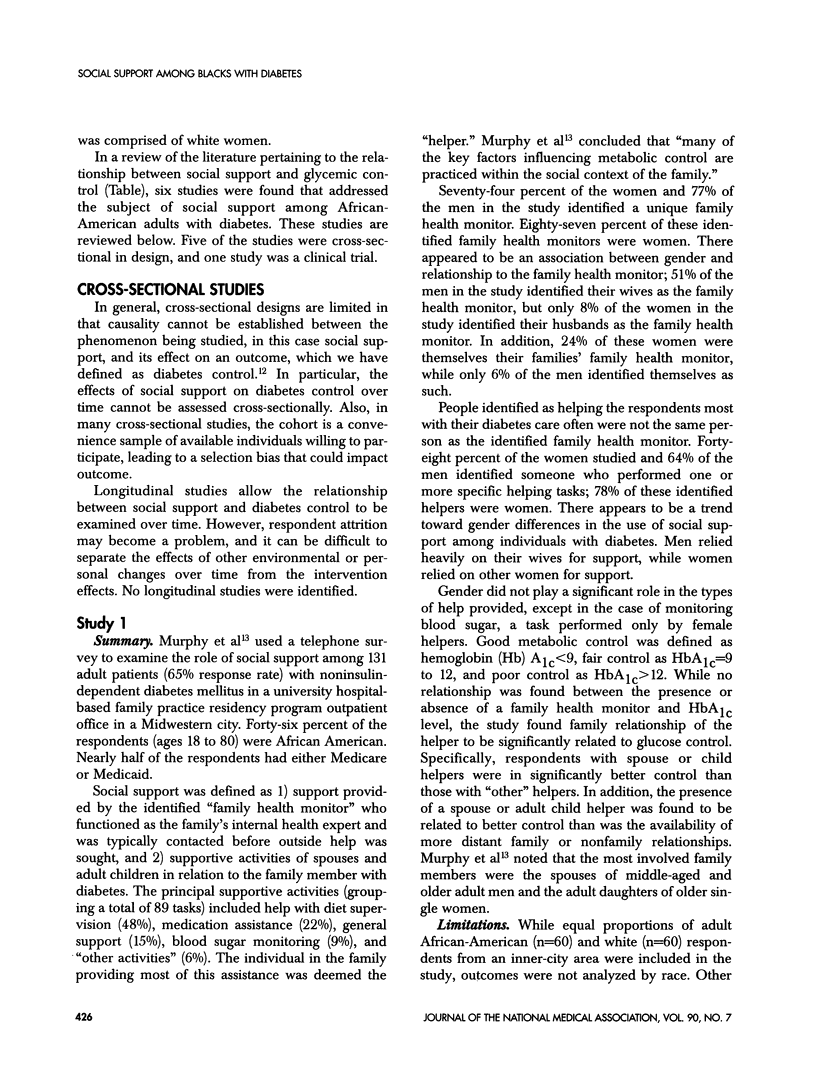
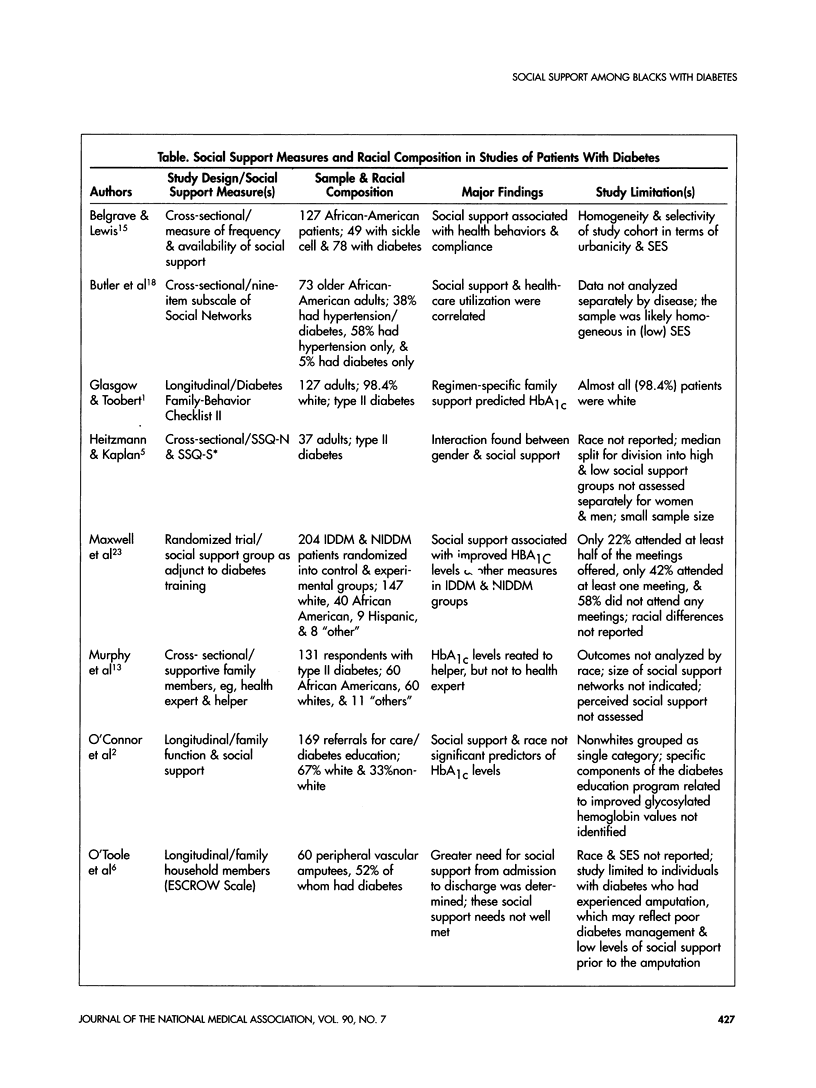
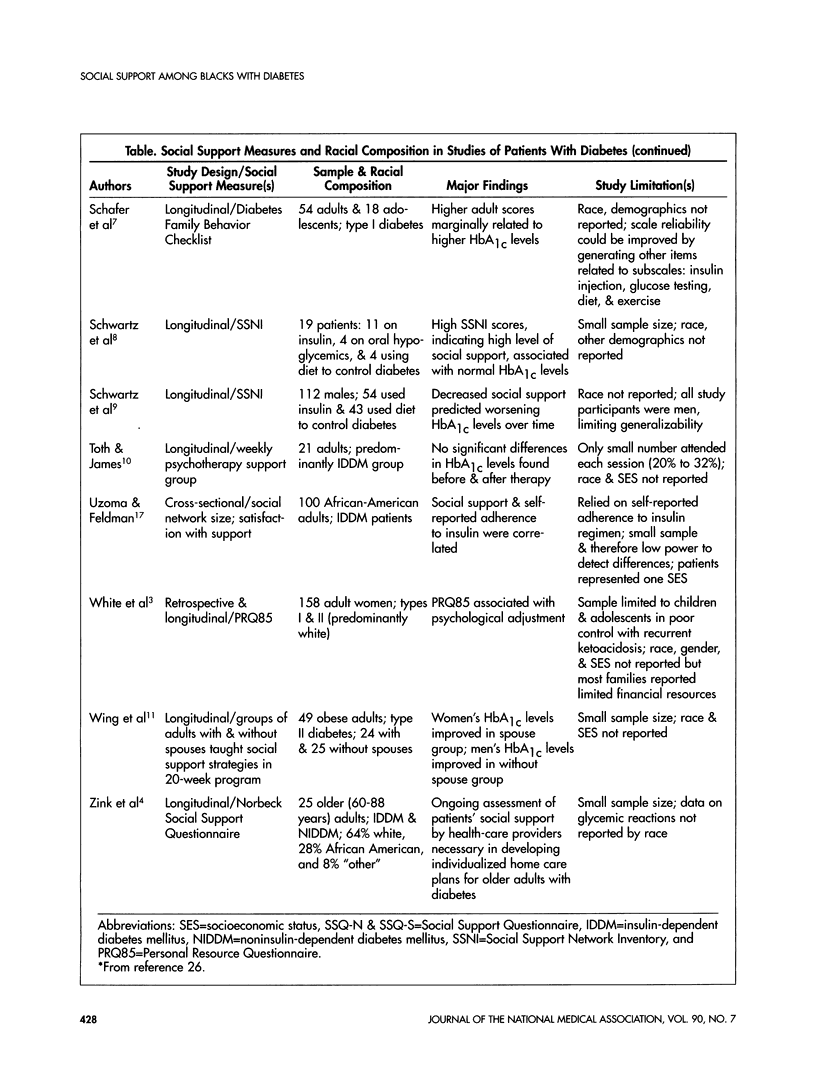
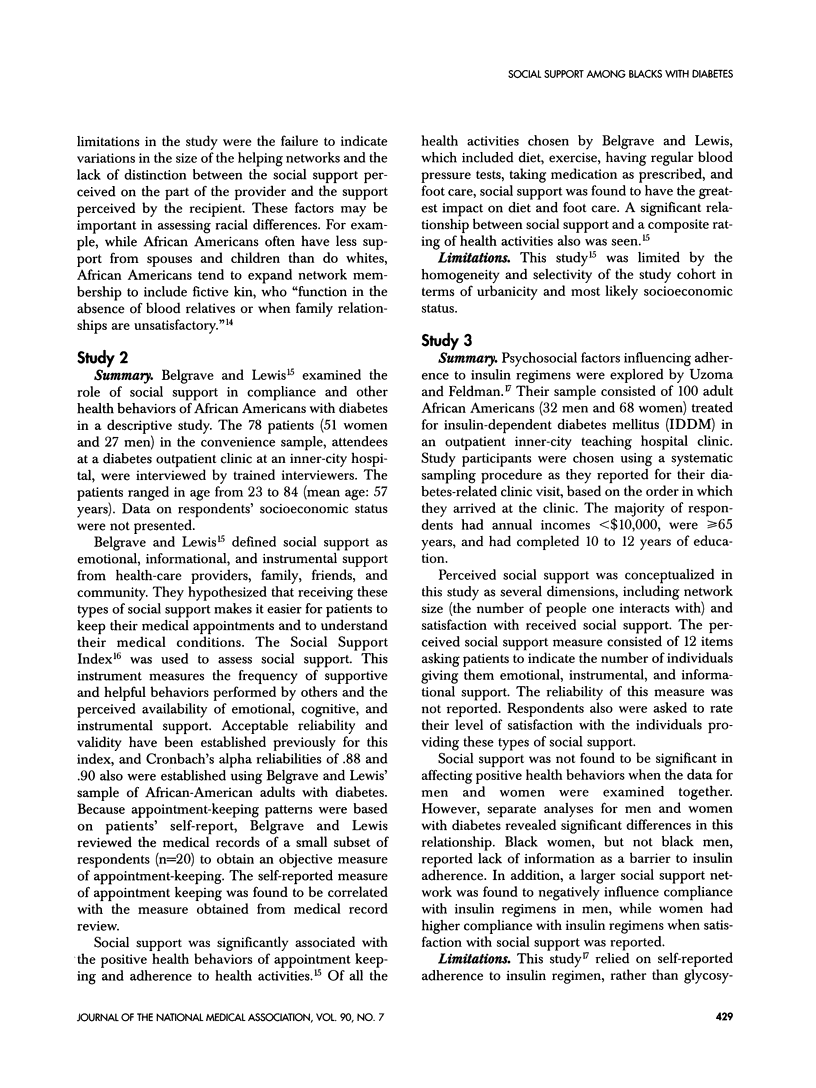
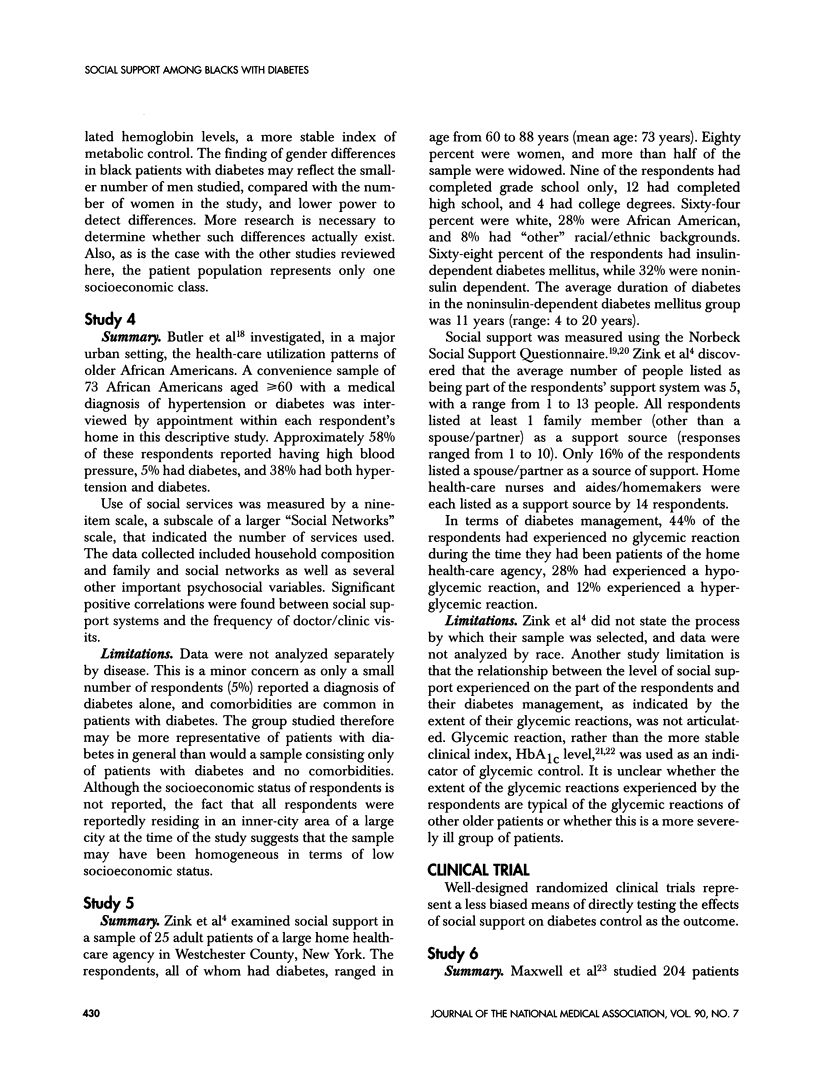
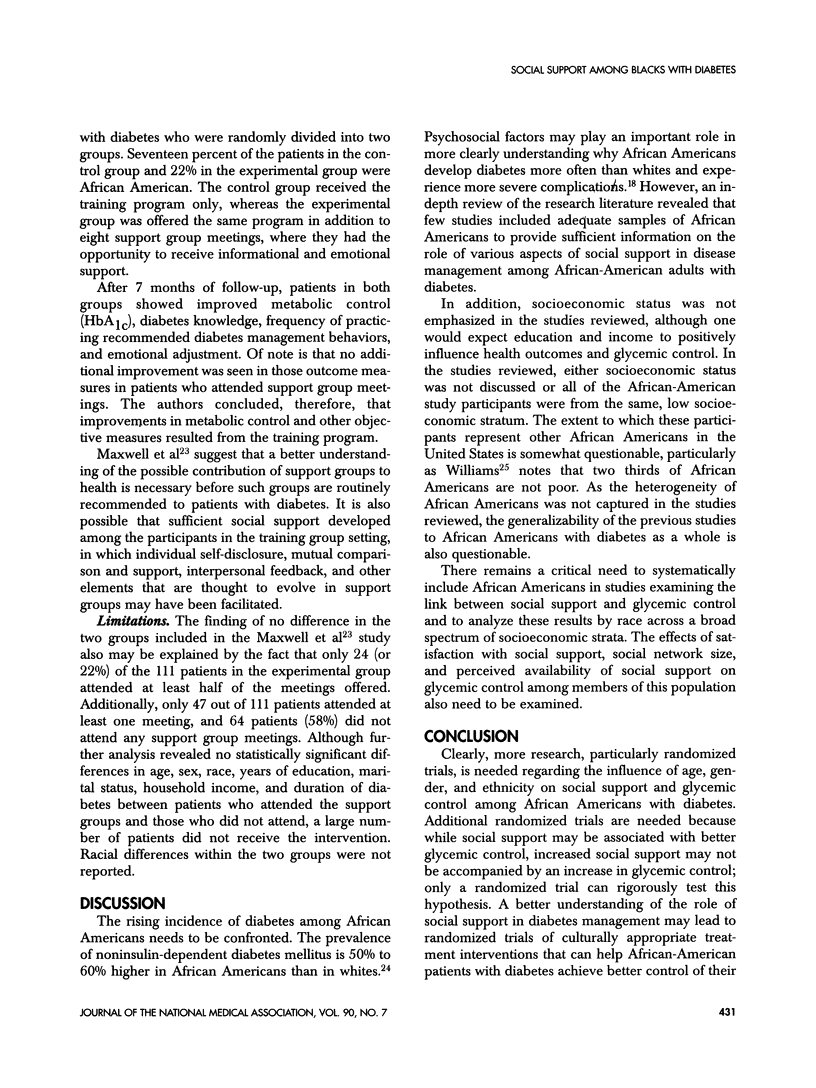
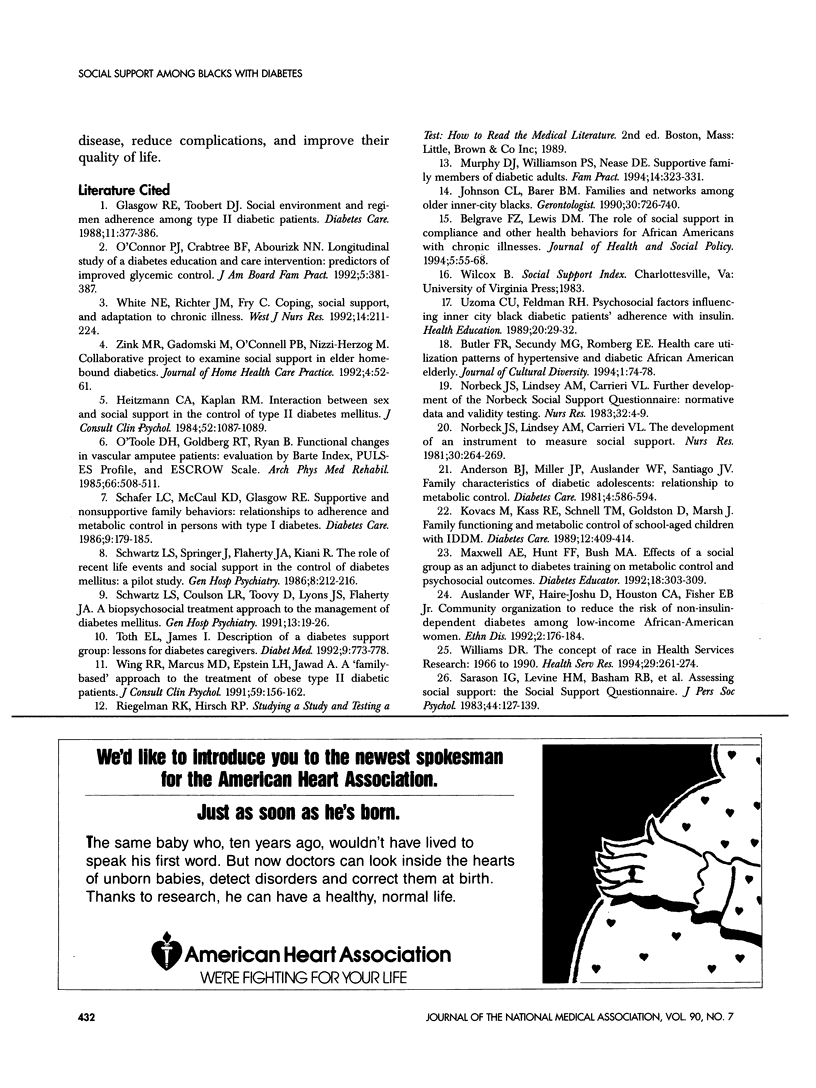
Selected References
These references are in PubMed. This may not be the complete list of references from this article.
- Anderson B. J., Miller J. P., Auslander W. F., Santiago J. V. Family characteristics of diabetic adolescents: relationship to metabolic control. Diabetes Care. 1981 Nov-Dec;4(6):586–594. doi: 10.2337/diacare.4.6.586. [DOI] [PubMed] [Google Scholar]
- Auslander W. F., Haire-Joshu D., Houston C. A., Fisher E. B., Jr Community organization to reduce the risk of non-insulin-dependent diabetes among low-income African-American women. Ethn Dis. 1992 Spring;2(2):176–184. [PubMed] [Google Scholar]
- Belgrave F. Z., Lewis D. M. The role of social support in compliance and other health behaviors for African Americans with chronic illnesses. J Health Soc Policy. 1994;5(3-4):55–68. doi: 10.1300/J045v05n03_05. [DOI] [PubMed] [Google Scholar]
- Butler F. R., Secundy M. G., Romberg E. E. Health care utilization patterns of hypertensive and diabetic African American elderly. J Cult Divers. 1994 Fall;1(4):74–78. [PubMed] [Google Scholar]
- Glasgow R. E., Toobert D. J. Social environment and regimen adherence among type II diabetic patients. Diabetes Care. 1988 May;11(5):377–386. doi: 10.2337/diacare.11.5.377. [DOI] [PubMed] [Google Scholar]
- Heitzmann C. A., Kaplan R. M. Interaction between sex and social support in the control of type II diabetes mellitus. J Consult Clin Psychol. 1984 Dec;52(6):1087–1089. doi: 10.1037//0022-006x.52.6.1087. [DOI] [PubMed] [Google Scholar]
- Johnson C. L., Barer B. M. Families and networks among older inner-city blacks. Gerontologist. 1990 Dec;30(6):726–733. doi: 10.1093/geront/30.6.726. [DOI] [PubMed] [Google Scholar]
- Kovacs M., Kass R. E., Schnell T. M., Goldston D., Marsh J. Family functioning and metabolic control of school-aged children with IDDM. Diabetes Care. 1989 Jun;12(6):409–414. doi: 10.2337/diacare.12.6.409. [DOI] [PubMed] [Google Scholar]
- Maxwell A. E., Hunt I. F., Bush M. A. Effects of a social support group, as an adjunct to diabetes training, on metabolic control and psychosocial outcomes. Diabetes Educ. 1992 Jul-Aug;18(4):303–309. doi: 10.1177/014572179201800408. [DOI] [PubMed] [Google Scholar]
- Murphy D. J., Williamson P. S., Nease D. E., Jr Supportive family members of diabetic adults. Fam Pract Res J. 1994 Dec;14(4):323–331. [PubMed] [Google Scholar]
- Norbeck J. S., Lindsey A. M., Carrieri V. L. Further development of the Norbeck Social Support Questionnaire: normative data and validity testing. Nurs Res. 1983 Jan-Feb;32(1):4–9. [PubMed] [Google Scholar]
- Norbeck J. S., Lindsey A. M., Carrieri V. L. The development of an instrument to measure social support. Nurs Res. 1981 Sep-Oct;30(5):264–269. [PubMed] [Google Scholar]
- O'Connor P. J., Crabtree B. F., Abourizk N. N. Longitudinal study of a diabetes education and care intervention: predictors of improved glycemic control. J Am Board Fam Pract. 1992 Jul-Aug;5(4):381–387. [PubMed] [Google Scholar]
- O'Toole D. M., Goldberg R. T., Ryan B. Functional changes in vascular amputee patients: evaluation by Barthel Index, PULSES profile and ESCROW scale. Arch Phys Med Rehabil. 1985 Aug;66(8):508–511. [PubMed] [Google Scholar]
- Schafer L. C., McCaul K. D., Glasgow R. E. Supportive and nonsupportive family behaviors: relationships to adherence and metabolic control in persons with type I diabetes. Diabetes Care. 1986 Mar-Apr;9(2):179–185. doi: 10.2337/diacare.9.2.179. [DOI] [PubMed] [Google Scholar]
- Schwartz L. S., Coulson L. R., Toovy D., Lyons J. S., Flaherty J. A. A biopsychosocial treatment approach to the management of diabetes mellitus. Gen Hosp Psychiatry. 1991 Jan;13(1):19–26. doi: 10.1016/0163-8343(91)90005-h. [DOI] [PubMed] [Google Scholar]
- Schwartz L. S., Springer J., Flaherty J. A., Kiani R. The role of recent life events and social support in the control of diabetes mellitus. A pilot study. Gen Hosp Psychiatry. 1986 May;8(3):212–216. doi: 10.1016/0163-8343(86)90083-6. [DOI] [PubMed] [Google Scholar]
- Toth E. L., James I. Description of a diabetes support group: lessons for diabetes caregivers. Diabet Med. 1992 Oct;9(8):773–778. doi: 10.1111/j.1464-5491.1992.tb01891.x. [DOI] [PubMed] [Google Scholar]
- Uzoma C. U., Feldman R. H. Psychosocial factors influencing inner city black diabetic patients' adherence with insulin. Health Educ. 1989 Dec;20(5):29–32. [PubMed] [Google Scholar]
- White N. E., Richter J. M., Fry C. Coping, social support, and adaptation to chronic illness. West J Nurs Res. 1992 Apr;14(2):211–224. doi: 10.1177/019394599201400208. [DOI] [PubMed] [Google Scholar]
- Williams D. R. The concept of race in Health Services Research: 1966 to 1990. Health Serv Res. 1994 Aug;29(3):261–274. [PMC free article] [PubMed] [Google Scholar]
- Wing R. R., Marcus M. D., Epstein L. H., Jawad A. A "family-based" approach to the treatment of obese type II diabetic patients. J Consult Clin Psychol. 1991 Feb;59(1):156–162. doi: 10.1037//0022-006x.59.1.156. [DOI] [PubMed] [Google Scholar]


